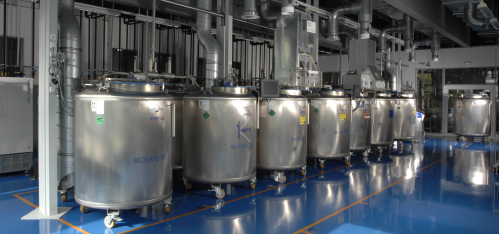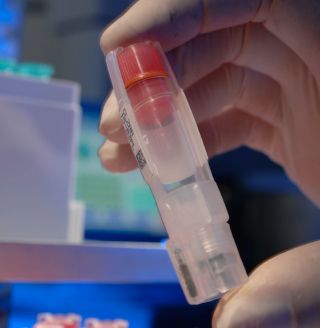EBiSC Products and Services
About the EBiSC Bank
The aim of the European Bank of induced pluripotent Stem Cells
(EBiSC) is to make human induced pluripotent stem cells (iPSCs)
easily accessible to researchers who are studying diseases and
developing new treatments. In addition to iPSC lines, EBiSC also offers
a supply of pre-differentiated cells such as EBiSC-NEUR1.
EBiSC cells have clear terms of use as outlined in
the EBiSC Access and Use Agreement (EAUA), such that a single EAUA
may be used to access cells from different
distributors.
Following the completion of two project phases between 2014 and
2023 (see History of EBiSC), long-term
banking and distribution operations have been assumed jointly by
Fraunhofer UK and Fraunhofer Institute for Biomedical Engineering
(IBMT).
Fraunhofer UK
Fraunhofer UK is the responsible legal entity for EBiSC and your main contact
point for any discussion regarding accessing EBiSC cells and services, as
well as collaborations.
Fraunhofer Institute for Biomedical Engineering
EBiSC’s distribution stock is held at the Fraunhofer Institute
for Biomedical Engineering (IBMT) in Sulzbach, Germany. The
facility is a fully automated, state of the art cryobanking system
with a self-contained low-temperature cool chain to ensure the
security and consistency of EBiSC cell lines. Fraunhofer IBMT also oversees EBiSC banking
quality control in accredited laboratories.

Biobank ©
Fraunhofer IBMT, Photo: Bernd Müller
About the EBiSC Catalogue
The EBiSC Catalogue is a collection of human
iPS cells available to academic and commercial researchers for use
in disease modelling and other forms of preclinical research.
Cell lines in the EBiSC catalogue have been made and deposited
by EBiSC partner labs and a number of external research
organisations including non-profit and commercial organisations.
Cell lines include iPSCs derived from individuals with diagnosed
diseases and apparently healthy controls, and genetically modified
isogenic sub-clones. EBiSC iPSCs are derived from both
biologically male and female donors, spanning ages 0-89 years and
covering more than 45 different diseases including
neurodegenerative, neurological, cardiac, liver, eye, blood,
kidney and skeletomuscular disorders. EBiSC continues to welcome
new iPSC line cohorts representing novel diseases, genotypes or
tools for use by the iPSC research community.
The EBiSC catalogue is closely linked with the human Pluripotent
Stem Cell registry (hPSCreg) and
EBiSC strives to share as much cell line data as possible, whilst
adhering to GDPR and protecting the rights of sample donors.
Non-identifiable data is shared as open access via the EBiSC
catalogue and ‘personal data’ as defined by GDPR is shared as
managed access via the EBiSC
Data Access Committee.
If you cannot find the lines you need, need support with ordering
or would like to discuss how you can share lines to be included in
the EBiSC catalogue, get in touch.

Smart cryo
tube with memory chip © Fraunhofer IBMT, Photo: Bernd Müller
About the EBiSC Services
EBiSC has amassed a network of expertise during its formative
years in two project phases funded by Innovative Medicines
Initiative Joint Undertaking (IMI-JU) and European Federation of
Pharmaceutical Industries and Associations (EFPIA).
Read more about the complete portfolio of EBiSC
services here.